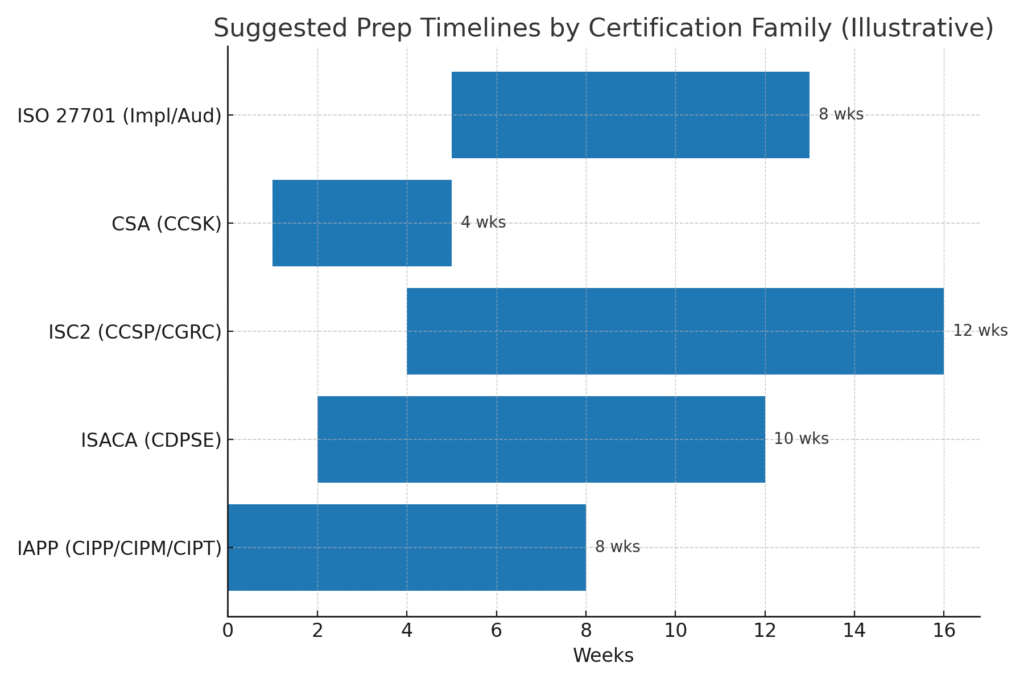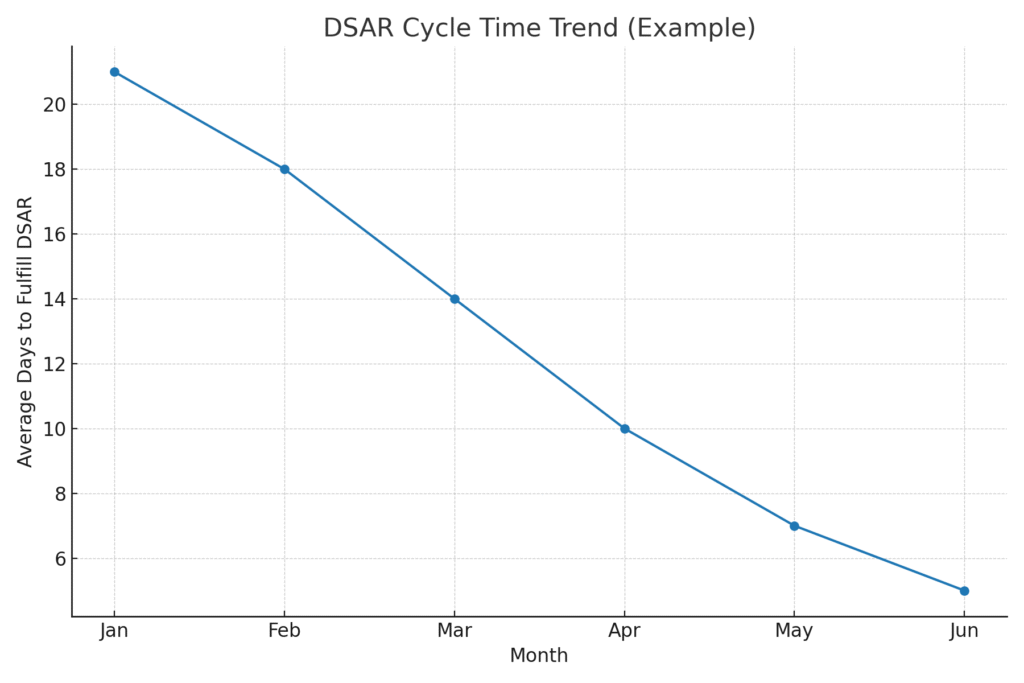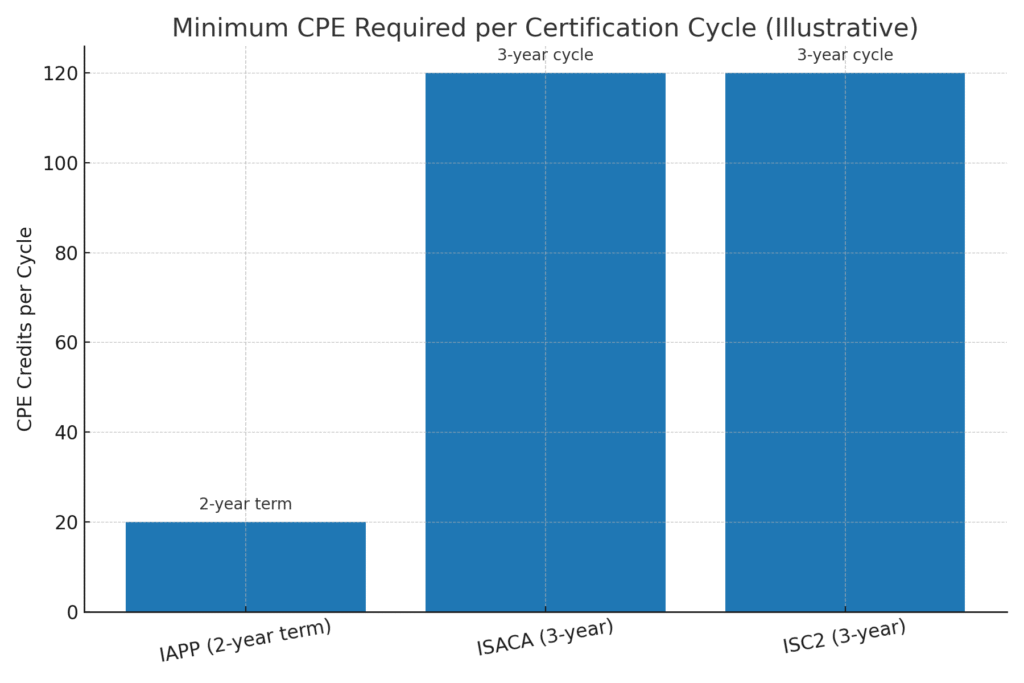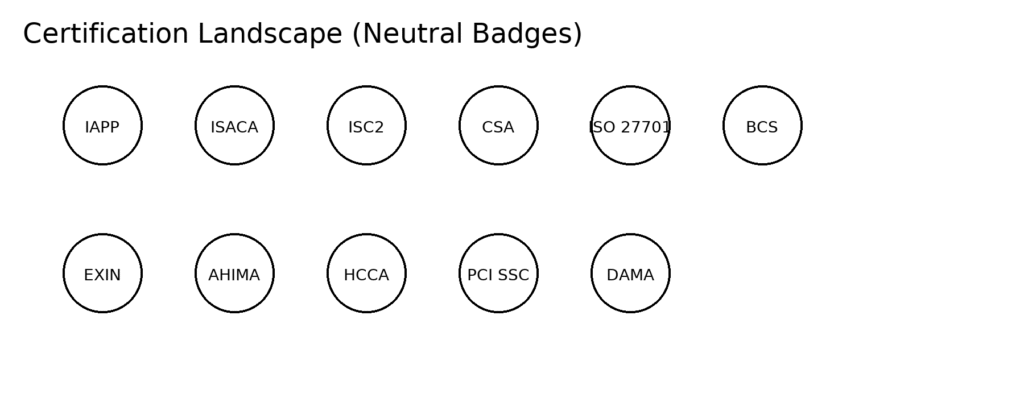Exam outlines and maintenance policies are continuously updated as new regulations come out. This comprehensive data privacy certification guide maps the privacy and adjacent security certifications you can earn — from IAPP’s ANAB/ISO-accredited CIPP/CIPM/CIPT to ISACA’s CDPSE, (ISC)²’s CCSP/CGRC, CSA’s CCSK, ISO/IEC 27701 implementer/auditor training, and sector credentials (AHIMA, HCCA, PCI). Use it to select the right credential for your career stage and jurisdiction, understand maintenance requirements, and assemble a study plan that fits your team and tech stack. The IAPP’s core certs (CIPP/E, CIPP/US, CIPM, CIPT) are recognized by the ANSI National Accreditation Board under ISO/IEC 17024, which matters for employer and regulator trust.
Captain Compliance additional resources: For hands-on help or if you’re working in a privacy role we’d love to showcase our privacy software to help save your organization time and money with our privacy tech solutions. See our Consent & Preference Management, DSAR Automation, Vendor Risk & DPAs, and Privacy Policy Generator.
How to Use This Guide (and Who It’s For)
This guide is organized by role (DPO/program manager, privacy counsel, privacy engineer/architect, GRC/audit lead, cloud/data leader) and by sector (healthcare, payments). Each certification entry covers who it’s for, what it proves, exam and experience basics, real-world use cases, renewal/CPE, and smart pairings so you can build a stack that signals competence to hiring managers, clients, and auditors.
- Choosing factors: Region/jurisdiction (EU/UK/US/CA/APAC), technical vs. legal depth, sector regulations (HIPAA, PCI DSS), and whether you need audit-ready proof (ISO/IEC 27701) versus engineering skills (CIPT/CDPSE) or cloud specialization (CCSP/CCSK).
- Maintenance reality: IAPP requires 20 CPE credits per certification per two-year term plus a maintenance fee; ISACA requires 20 CPEs annually and 120 over three years; (ISC)² requires 120 CPEs over a three-year cycle (often managed at ~40/year).

The Core Privacy Stack (IAPP): Law, Operations, and Technology
The IAPP suite is the most widely recognized global privacy credential set and is accredited by ANAB under ISO/IEC 17024 (CIPP/E, CIPP/US, CIPM, CIPT). For many roles, one legal (CIPP), one operational (CIPM), and one technical (CIPT) certification create a well-rounded baseline that employers, regulators, and clients understand.
CIPT — Certified Information Privacy Technologist
What it proves: You can engineer privacy into real systems — web, mobile, data pipelines, and cloud. CIPT covers data-protection by design/default, de-identification techniques (pseudonymization, anonymization), PETs, threat modeling, consent and preference wiring, identity/attribute flows, and how to translate policy into code and evidence. With 2025 updates landing Sept 1, the body of knowledge reflects modern realities (server-side tagging, modeled measurement, LLM features, and memory controls).
Use cases: (1) Implementing a consent management platform tied to standardized signals and gating tags/SDKs and server-side events; (2) introducing privacy guardrails to data products (minimization and retention jobs, role-based access); (3) documenting DPIA-friendly patterns for new features; (4) designing DSAR-friendly data architectures (fewer copies, faster deletes); (5) implementing privacy in AI features (input/output retention limits, prompt logging minimization, user transparency).
Who it’s for: Privacy engineers/architects, product and data leaders, senior full-stack or platform engineers collaborating with legal/DPOs.
Exam & prep: Delivered via Pearson VUE. Expect scenario questions mapping policy to architecture choices. Updated forms effective Sept 1, 2025 — check IAPP’s update notice and free study guides. Typical prep 8–10 weeks with hands-on lab work (GTM/SDK gating, server-side consent enforcement, data deletion jobs).
Renewal: 20 CPE per two-year term + maintenance fee; CPEs often overlap with other IAPP certs.
Smart pairings: CDPSE (engineering privacy solutions), CCSP/CCSK (cloud), ISO/IEC 27701 implementer (management system proof).
CIPP/E and CIPP/US — Regional Law Mastery
What they prove: Deep knowledge of GDPR/UK GDPR (CIPP/E) or U.S. federal+state sectoral frameworks (CIPP/US), including lawful bases, data subject rights, transfers, and enforcement. Great for DPOs, counsel, and policy leads. IAPP updates the exams annually; 2025 forms take effect Sept 1.
Use cases: Translating regulatory text into policies, records (RoPA), DPIAs, cross-border transfer mechanisms, and vendor terms that survive scrutiny.
Exam & prep: Computer-based testing via Pearson VUE; prep 6–10 weeks.
Renewal: 20 CPE per two-year term + fee.
CIPM — Privacy Program Management
What it proves: You can turn policy into a running program — charters, roles, KPIs, training, DSAR SLAs, incident tabletop drills, retention schedules, and evidence. IAPP positions CIPM as “operationalizing privacy.”
Use cases: Designing and executing the 0–90 day privacy rollout, converting DPIA outputs into engineering tickets, and reporting to executives/boards.
Renewal: 20 CPE per two-year term.

PLS — Privacy Law Specialist (US attorneys)
ABA-accredited specialty for U.S. lawyers; pairs with CIPP/US plus CIPM or CIPT and ethics requirements. Useful if your practice markets privacy specialization. Check your state’s rules on specialist advertising.
Great catch — you’re absolutely right. The IAPP’s **AIGP (Artificial Intelligence Governance Professional)** belongs in your guide. Here’s a **WordPress-ready section** you can paste in (I’ve also noted exactly where to place it). I’ve included who it’s for, what it proves, the 2025 Body-of-Knowledge domains and blueprint ranges, exam format, prep, renewal, and smart pairings—plus an internal link to your **AI Governance** service page.
AIGP — Artificial Intelligence Governance Professional (IAPP)
What AIGP proves: You can lead responsible AI governance—ensuring AI systems are designed, deployed, and managed to be safe, trustworthy, and compliant with emerging laws and standards. The credential validates applied governance across the AI life cycle (from use-case scoping and data governance, to model release, monitoring, incident handling, and public transparency). The current AIGP Body of Knowledge (BoK) was updated in 2025 and reflects modern realities like general-purpose models and the EU AI Act’s risk-based requirements.
AIGP Study Guide – Our Chief Privacy Officer Alex Proctor has put together the most comprehensive and free AIGP study guide for those wanting to take the exam. Download the guide for free here.
Who it’s for: Privacy engineers/architects, DPOs and program leaders overseeing AI, product & data leaders, GRC teams, and counsel who must translate policy into operational controls. If your roadmap includes AI features, vendor AI risk reviews, or EU AI Act readiness, AIGP squarely fits your needs. :contentReference
Domains & Exam Blueprint (effective Feb 3, 2025)
- Domain I — Understanding the foundations of AI governance (approx. 16–20 items): Principles, roles, awareness, policies, and cross-functional collaboration across the AI life cycle.
- Domain II — How laws, standards & frameworks apply to AI (approx. 19–23 items): Applying privacy law concepts (notice/consent, minimization, DPIAs, rights, breach), non-discrimination, consumer protection, product liability, plus frameworks like OECD, NIST AI RMF/ARIA, ISO 22989/42001, and EU AI Act (including GPAI).
- Domain III — Governing AI development (approx. 21–25 items): Use-case scoping, risk assessment, data governance & lineage, training/testing (bias, interpretability, security), documentation, readiness for release, and continuous monitoring.
- Domain IV — Governing AI deployment & use (approx. 21–25 items): Model selection, deployment, ongoing monitoring/maintenance, incident management, stakeholder comms and transparency artifacts (e.g., model cards).
Why this matters: The blueprint emphasizes practical responsibilities over theory—exactly what hiring managers and auditors look for when they ask how you govern vendor models, control data flows, and evidence compliance over time.
Exam format, prep & renewal
- Format: 100 multiple-choice questions; ~2.75 hours with an optional 15-minute break; available online (proctored) or at test centers.
- Study approach: Start with the 2025 BoK + integrated blueprint to weight your study time. Pair reading with applied work: run an AI use-case assessment, map data lineage, draft a model card, and simulate an incident runbook. IAPP offers official AIGP training (in-person, live online, or self-paced) and a digital practice exam.
- Renewal: As with other IAPP designations, maintain via Continuing Privacy Education (submit 20 CPEs per certification per two-year term and pay the maintenance fee).
Real-world AIGP use cases
- EU AI Act readiness: Classify systems by risk; establish risk management, data governance, human oversight, technical documentation, post-market monitoring plans, and conformity assessment prep where applicable.
- Vendor & GPAI diligence: Evaluate third-party providers and general-purpose models against NIST AI RMF categories; require disclosures (training data provenance, evaluation results), map responsibilities, and define incident reporting timelines.
- Data governance for AI: Prove lawful basis/rights for training data, implement minimization and retention limits, and record data lineage so DSARs and deletions propagate. :contentReference
- Responsible release & monitoring: Create model cards, establish thresholds and guardrails, schedule bias/robustness/security tests, and document findings with remediation SLAs.
CISSP — Certified Information Systems Security Professional (ISC)²
Why it belongs in a privacy guide: CISSP isn’t a “privacy” cert per se, but it’s the gold-standard security credential for leaders who design and govern enterprise controls. If you’re a DPO, privacy engineer, or GRC lead working cross-functionally with security, CISSP signals you can align privacy requirements with real security architecture and operations.
What it proves: Breadth and depth across eight security domains (governance, risk, asset security, comms & network, IAM, security engineering, assessment, and operations). It validates the ability to design, implement, and manage a security program—skills that directly support privacy by design and accountability.
Experience & exam: Candidates need five years of cumulative paid experience in two or more CISSP domains (some education/other credentials can waive one year). The English exam uses computerized adaptive testing (CAT), allowing 100–150 items in a shorter sitting than the legacy fixed form.
Maintenance: CISSP holders complete continuing professional education over a three-year cycle under (ISC)²’s CPE program. (ISC)² provides the CPE handbook and guidance to manage credits through the cycle.
Who it’s for: Privacy leaders who must partner with security (DPOs, heads of data/AI governance), privacy engineers stepping into platform/security architecture, and GRC owners who sign off on enterprise controls.
Smart pairings: CIPT or CDPSE (privacy in technology/engineering), CCSP (cloud depth), and ISO/IEC 27701 Implementer (privacy MS).
CDPO — Certified Data Protection Officer
What “CDPO” means: Unlike CIPP/CIPM/CIPT (one issuing body, IAPP), “CDPO” is offered by several bodies. Employers recognize it as a practitioner-level credential for professionals performing the GDPR/UK GDPR DPO function. The best-known routes include EXIN CDPO, PECB Certified Data Protection Officer, and IAPP’s CDPO/BR and CDPO/FR programs for Brazil and France.
- EXIN Data Protection Officer (CDPO): Focuses on GDPR knowledge and the competencies to implement and maintain a privacy program in practice—aimed at aspiring or current DPOs.
- PECB Certified Data Protection Officer: Training and certification aligned to GDPR with practical exercises (DPIAs, lifecycle, incident handling). Exam: typically 3 hours, 150 multiple-choice questions; certification scheme documented in the PECB candidate handbook (ISO/IEC 17024 based).
- IAPP CDPO/BR & CDPO/FR: Regional DPO certifications aligned to LGPD (Brazil) and DPO practice in France, offered within IAPP’s portfolio. Useful if you operate under those regimes.
Who it’s for: Practitioners who act as the organization’s DPO or DPO-equivalent (internal or fractional) and need a credential signaling GDPR-grade competence in governance, monitoring compliance, DPIAs, vendor oversight, and SA liaison.
Use cases: Establishing/leading the privacy program, executing DPIAs and RoPA upkeep, managing DSARs and incident response, advising on lawful bases and cross-border transfers, and proving accountability in audits.
Smart pairings: CIPP/E + CIPM (legal + program ops), ISO/IEC 27701 Implementer (PIMS), and CIPT/CDPSE if you own privacy-in-tech decisions.
CDP — Certified in Data Protection (Identity Management Institute)
What it is: A generalist privacy credential from the Identity Management Institute (IMI) designed for professionals who want a broad understanding of data protection without going deep into legal doctrine or highly technical build work. It covers global privacy standards, risk management, and key privacy responsibilities across the data lifecycle.
Format & membership: Candidates join IMI, request the official study guide, and complete an online examination to earn the CDP designation. Application and membership steps are handled directly through IMI.
Who it’s for: Business owners, PMs, analysts, HR/ops, and security generalists who collaborate with privacy teams and need a credential to demonstrate baseline competency in privacy and data protection concepts.
When to choose it: As an on-ramp to privacy work, as a stepping stone before IAPP/ISACA tracks, or as a complementary credential for identity/GRC practitioners.
Comparison table of CISSP vs CDPO vs CDP
| CISSP | (ISC)² | Enterprise security leadership & architecture | Privacy leaders, engineers, GRC owners partnering with security | 3-year CPE cycle |
| CDPO | EXIN / PECB / IAPP (regional) | DPO practice: GDPR-grade governance, DPIAs, program ops | DPOs & senior practitioners | Varies by issuer |
| CDP | IMI | Generalist privacy & data protection | Analysts, managers, identity/GRC generalists | IMI membership + renewal |
Smart pairings & how it fits your stack
- CIPT (privacy in technology) for SDLC depth; CDPSE for architecture & lifecycle; CCSK/CCSP for cloud environments; ISO/IEC 27701 to anchor AI governance in a PIMS. These combinations help teams implement controls and produce evidence auditors trust.
- Need help operationalizing AIGP practices? See our AI Governance services to turn the blueprint into policies, controls, and dashboards your leaders can review.
CDPO/BR — Brazil DPO (IAPP)
Targeted to LGPD DPOs; typically layered with CIPM. Consider it if you serve Brazil-based controllers/processors.
Technical & Engineering Track: Build and Verify Privacy by Design
CDPSE — Certified Data Privacy Solutions Engineer (ISACA)
What it proves: You architect and implement privacy solutions across governance, risk, architecture, and data lifecycle. ISACA updated CDPSE job practice areas in 2025 (effective as of June 2), reflecting modern privacy engineering demands. Domains and weights are detailed in the current exam content outline.
Use cases: Designing end-to-end consent enforcement (client, app, and server-side), embedding minimization and retention into data platforms, structuring DPIA-driven controls, and aligning product telemetry with policy.
Exam & prep: Practice-oriented scenarios; typical prep 8–12 weeks, ideally with hands-on projects. ISACA provides self-paced and group training.
Renewal: 20 CPE annually and 120 over three years, plus annual maintenance fee.
Pairings: CIPT for SDLC execution; CCSP for cloud depth; ISO/IEC 27701 implementer for management system alignment.
CCSP & CGRC (with CISSP as a breadth booster) — (ISC)²
CCSP: Advanced cloud security design/operations and regulatory alignment — ideal for privacy engineers who collaborate with platform teams. Experience requirements include five years IT (three in security).
CGRC: Governance/risk/compliance with emphasis on authorizing and maintaining information systems under formal frameworks (e.g., NIST RMF) — bridges privacy and GRC.
Renewal: (ISC)² members submit 120 CPEs over a three-year cycle with policies in the CPE handbook; many target ~40/year.
CCSK — Certificate of Cloud Security Knowledge (CSA)
What it proves: Vendor-neutral cloud security knowledge that complements privacy engineering (shared responsibility, cloud data protection patterns). Open-book online exam with 60 questions; CSA offers an official prep kit.
ISO/IEC 27701 — PIMS Implementer/Auditor Training
Why it matters: Extends ISO 27001 to include privacy controls, giving organizations a management system to demonstrate accountability and embed privacy practices. Training via BSI and others prepares you to implement or audit PIMS.

Legal & Policy Track (Beyond CIPP)
BCS Practitioner Certificate in Data Protection (UK/EU)
Practical UK/EU-centric qualification aligned to UK GDPR/DPA 2018, popular with UK DPOs and data protection leads. Suits professionals who already handle data-protection responsibilities and want applied training.
EXIN Privacy & Data Protection (Foundation → Professional) & EXIN DPO
EXIN’s GDPR pathway offers Foundation/Professional tiers and a DPO designation for hands-on implementers. Useful for teams seeking structured, exam-backed curricula without committing to IAPP.
GIAC GLEG — Law of Data Security & Investigations
Bridges privacy, digital investigations, and security law — valuable for counsel and response leaders who handle breach, monitoring, and evidence. Recertification cycles use CPEs/testing.
Governance, Risk & Audit Track
ISACA CISA / CISM / CRISC
Classic trio for audit (CISA), security leadership (CISM), and risk (CRISC) — often paired with privacy credentials to lead enterprise GRC and audit programs. Maintenance typically 20 CPEs annually and 120 per three-year cycle.
DAMA CDMP (Data Governance Orientation)
Validates data management fundamentals (governance, quality, metadata, architecture) that underpin minimization, retention, and DSAR performance. Associate/Practitioner/Master tiers build progressively; Fundamentals exam is required.
Sector-Specific Credentials
Healthcare: AHIMA CHPS (and HCCA’s CHPC/CHC)
CHPS: Recognizes leaders who can design and operate healthcare privacy & security programs; exam domains include legal/regulatory, operations, and incident response.
HCCA: CHPC/CHC/CHRC credentials add compliance depth for provider and research settings.
Payments: PCI SSC PCIP
Entry-level, individual PCI credential; helpful for e-commerce and hospitality teams to understand cardholder data flows and PCI DSS requirements.
Cloud Privacy Standard Familiarity: ISO/IEC 27018
Not a person certification, but knowing the controls for protecting PII in public clouds is valuable for DPIAs and vendor due diligence (major cloud providers certify to it).
Which Certification First? Role-Based Tracks
Use these tracks to prioritize the first two credentials that unlock your next role, then add depth:
- Aspiring DPO (EU/UK): CIPP/E → CIPM → ISO/IEC 27701 Implementer → BCS/EXIN for jurisdictional practice. :contentReference
- Privacy Engineer / Architect: CIPT → CDPSE → CCSP/CCSK → ISO/IEC 27701 (implementer/auditor).
- Privacy Counsel (US): CIPP/US → CIPM or CIPT → PLS (state rules permitting).
- Healthcare Privacy Lead: CIPP/US (or CIPP/E) → CHPS → ISO/IEC 27701 Implementer.
- Cloud/Data Leaders: CCSK → CCSP → CIPT/CDPSE → ISO 27018 familiarity for vendor reviews.

Time & Money: Renewal, CPEs, and What to Budget
- IAPP: 20 CPEs per certification per two-year term + maintenance fee (members often covered); CPE crossover allowed.
- ISACA (e.g., CDPSE/CISA/CISM): 20 CPEs annually and 120 over three years + annual fee.
- (ISC)² (e.g., CCSP/CGRC/CISSP): 120 CPEs over a three-year cycle; see member policies/handbook for details.
Study Stack: Official & Efficient Prep
Start with official blueprints and study guides. For IAPP, download free guides and watch for the Sept 1, 2025 exam-form updates. For CDPSE, use ISACA’s content outline and review course materials aligned to the June 2025 domains. For (ISC)², lean on the official study resources for CCSP/CGRC; for CCSK, CSA’s prep kit is excellent; for ISO/IEC 27701, use BSI’s implementation guide to map PIMS controls.
Comparison Table
| Certification | Body | Focus | Who It’s For | Renewal |
|---|---|---|---|---|
| CIPT | IAPP | Privacy in technology; PETs; SDLC | Privacy engineers/architects, product/data leads | 20 CPE/2 years |
| CIPP/E (EU) / CIPP/US (US) | IAPP | Regional legal frameworks | Counsel, DPOs, policy leads | 20 CPE/2 years |
| CIPM | IAPP | Program operations & governance | DPOs, program managers | 20 CPE/2 years |
| CDPSE | ISACA | Privacy engineering, architecture, lifecycle | Engineers, architects | 20/yr & 120/3 yrs |
| CCSP | (ISC)² | Cloud security architecture/ops | Cloud & platform teams | 120/3 yrs |
| CGRC | (ISC)² | GRC & authorization (e.g., NIST RMF) | Risk/audit leaders | 120/3 yrs |
| CCSK | CSA | Vendor-neutral cloud security | Cloud/security/privacy teams | Exam retake/refresh |
| ISO/IEC 27701 | ISO/BSI | PIMS implementer/auditor training | DPOs, GRC, auditors | N/A (training, not person cert) |
| BCS PCDP | BCS | UK/EU applied data protection | UK DPOs & practitioners | CPD varies |
| EXIN PDPP | EXIN | GDPR professional level | EU practitioners | CPD varies |
| AHIMA CHPS | AHIMA | Healthcare privacy & security | Provider/payer privacy leads | AHIMA CEU cycle |
| PCI PCIP | PCI SSC | Payment card security fundamentals | E-commerce/payments teams | Requalification |
FAQs About Privacy Certifications
Are IAPP certs accredited? Yes. CIPM, CIPP/E, CIPP/US and CIPT are ANAB-accredited under ISO/IEC 17024:2012.
What changed for CDPSE in 2025? ISACA updated job practice areas and the exam effective June 2, 2025, with new prep materials in April 2025.
CCSK vs. CCSP: which first? CCSK is vendor-neutral and faster to earn; CCSP goes deeper with experience requirements and broader domain coverage. Many do CCSK first, then CCSP.
Do I need CISSP? Not required for privacy roles, but helpful breadth if you aim for security leadership; pair with CCSP/CGRC if you straddle privacy & security.
Where do ISO/IEC 27701 and ISO/IEC 27018 fit? 27701 is a PIMS extension to 27001 for organizational accountability; 27018 sets cloud-PII controls used in vendor reviews and DPIAs.
Where Captain Compliance Fits In
We would love to work with you and your organization if you have any of the privacy certifications above. Captain Compliance is passionate about data privacy and working with other great minds who want to use our modules to help automate and speed up processes in the maturing privacy of your organization.